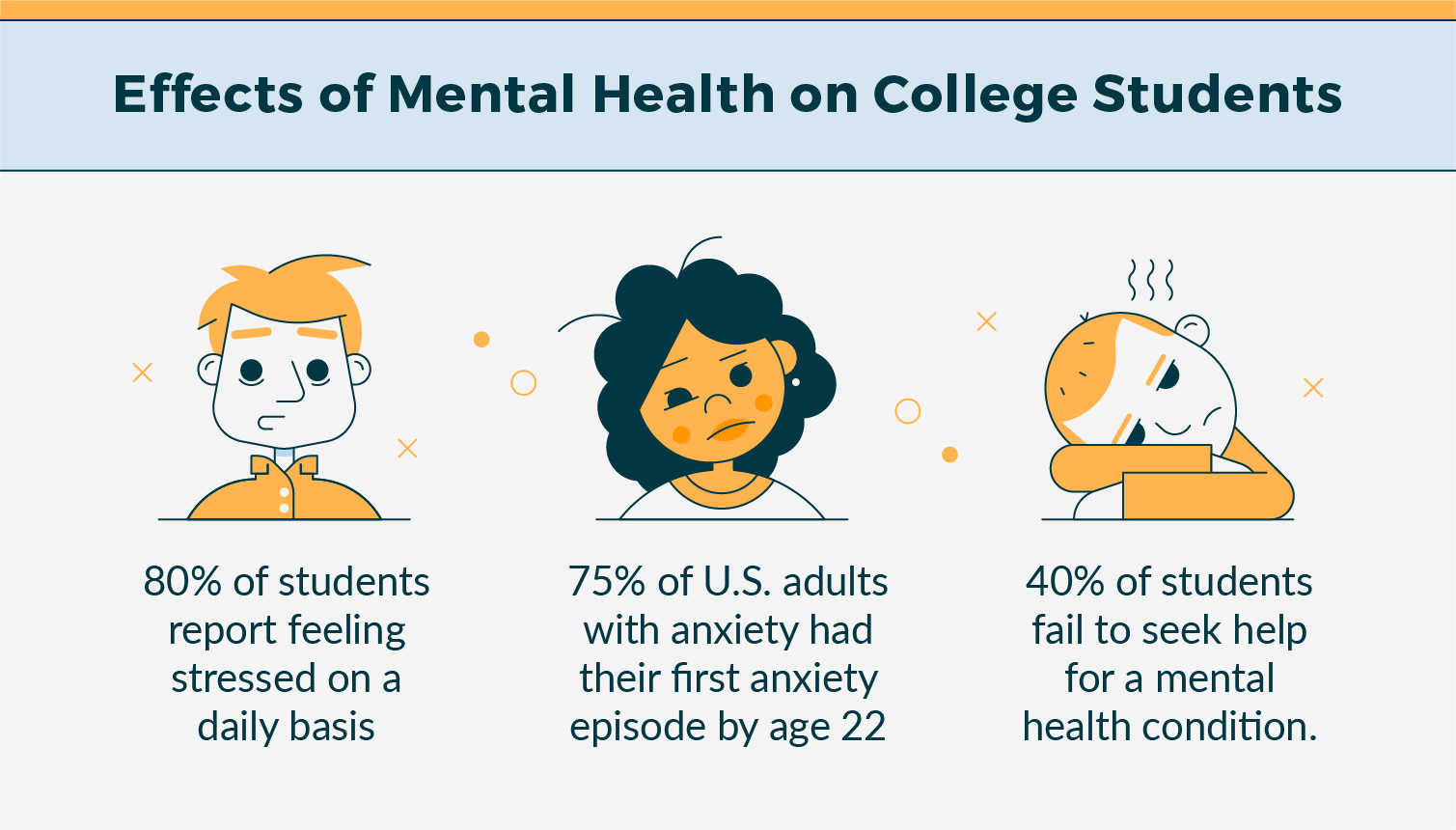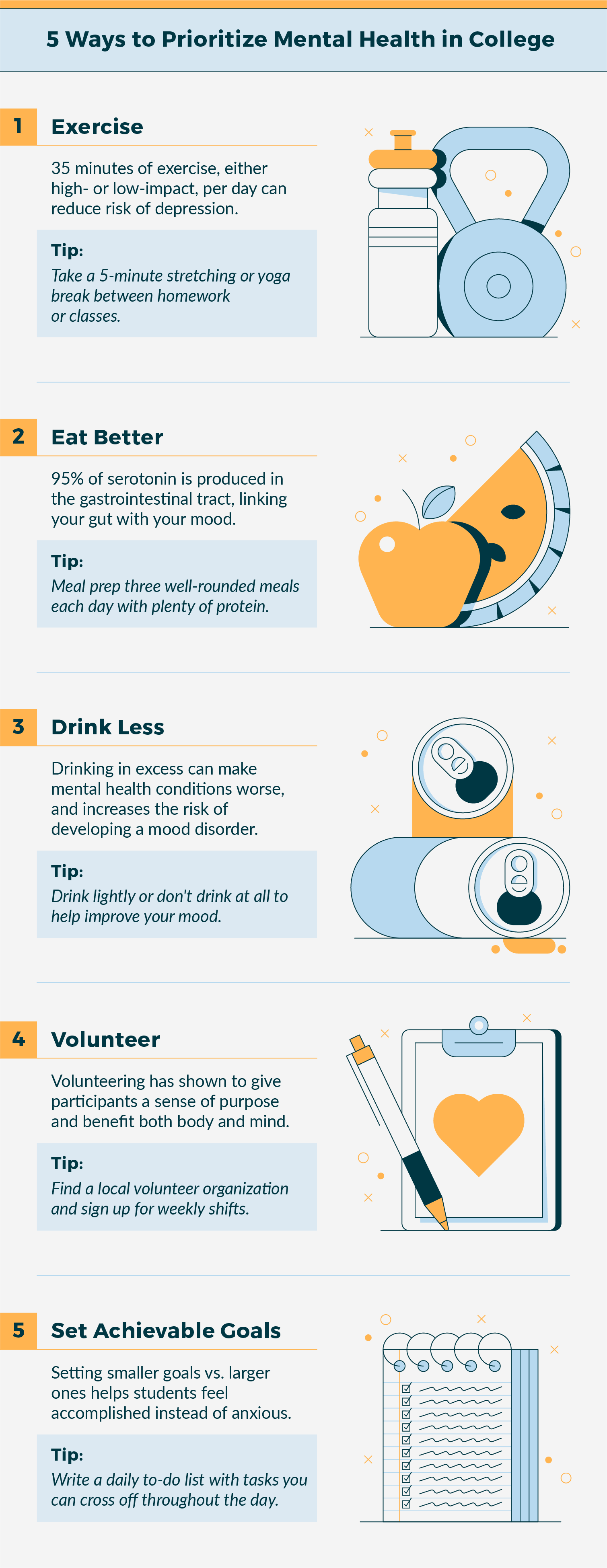Being a college student requires balancing many demands and responsibilities: schoolwork, classes, exams, extracurriculars and sometimes off-campus jobs or internships. It can seem overwhelming to manage all of those responsibilities and your own wellbeing, but it’s important to maintain your own mental health as a college student.
There are many ways college students can focus on themselves and their mental health without sacrificing their grades or other college experiences. Keep reading to learn more about how you can focus on caring for your mental (and physical) wellbeing, or jump down to the infographic for some actionable tips and mental health mantras.
Table of Contents:
- Common Mental Health Conditions Facing College Students
- Academic Accommodations for Students with Mental Health Conditions
- Finding On- and Off-Campus Support
- 10 Ways to Maintain Mental Health in College
- Benefits of Online College for Students with Mental Health Conditions
Common Mental Health Conditions Facing College Students

While college is fun and exciting, it can also be scary, stressful and overwhelming. With everything college students juggle on a weekly basis, it’s no wonder that 85 percent of college students reported feeling overwhelmed by all their responsibilities within the past year.
Among general stress, concern and worry, there are other, more serious diagnosed mental health conditions that affect college students at a high rate. Keep reading to learn more about these five conditions, ranging from anxiety to sleep disorders.
These are not intended to be a diagnosis for any major mental health conditions. If you feel as if you may have any of these conditions, consult a doctor or therapist for next steps.
1. Anxiety
According to the Center for Collegiate Mental Health 2017 Annual Report, anxiety and depression are the two most common reasons college students seek out mental health services. Twenty-three percent of observed students sought treatment for anxiety, making this a pressing issue. Experts have speculated the large numbers of college students with anxiety is likely due to these students undergoing a major life transition.
Some common symptoms of anxiety are unease, nervousness, insomnia, inability to stop worrying and a sense of impending doom. While most people will be anxious at one time or another, those with Generalized Anxiety Disorder (GAD) will experience excessive amounts of anxiety on a near daily basis. This includes stress about small things, like classes or finances, as well as larger things like careers, relationships and family.
Some of the symptoms of GAD include:
- Irritability
- Feelings of restlessness or being on-edge
- Difficulty concentrating
- Sleep problems, including difficulty falling asleep or unsatisfying sleep
- Being easily fatigued
If you’re experiencing any of these symptoms or feeling stressed more than you feel relaxed, it may be time to seek some help. Speak to a counselor or specialist at your university’s student health services to see what options are available for helping you deal with anxiety.
2. Depression
Depression is another prevalent issue among college students, with the Center for Collegiate Mental Health 2017 Annual Report identifying 18.8 percent of observed college students seeking treatment for depression. A 2012 study by the National Institute for Mental Health reported 30 percent of students feeling “so depressed it was difficult to function,” and identified that many people will experience depression for the first time in their lives while in college.
There are three kinds of depression that are the most common:
- Major depressive disorder, also known as major depression, can be disabling. The symptoms of this disorder affect everyday activities, such as sleeping, eating, homework and more. Some people with major depression will only experience one depressive episode, while others will experience episodes on and off throughout their lives.
- Dysthymic disorder, also called dysthymia, is mild but chronic depression. Symptoms can last a long time, up to two years or even longer. This is less severe than major depression, but can still interfere with everyday activities, and can sometimes lead to major depressive episodes.
- Minor depression is less serious than both major depression and dysthymia, and symptoms generally last a shorter time. However, those with minor depression are still at risk for developing major depressive disorder later in life.
Seasonal affective disorder is another type of depression that affects college students as well, which happens during cold, dark winter months but improves in the warmer, sunnier months of spring and summer.
While symptoms of depression vary from person to person, here are some of the most common symptoms of depression in college students:
- Feelings of anxiety, sadness, guilt, worthlessness, restlessness or hopelessness
- High irritability
- Loss of enjoyment in activities
- Lack of energy
- Problems falling asleep, staying asleep or feeling well-rested
This is not a comprehensive list of symptoms, so there may be others you are experiencing that are not listed here. If you worry you or a friend may be experiencing symptoms of depression, talk to a doctor or loved one about next steps.

3. Eating Disorders
Eating disorders are a serious condition that are unfortunately very prevalent on college campuses. Experts believe that the challenges of college life, including increased focus on peers, a heavy workload and less structure, all combine with preexisting conditions such as anxiety for those who develop an eating disorder in college.
The most common eating disorders are anorexia and bulimia, which are most likely to begin as a full-blown disorder between 18 and 21 years of age. The National Eating Disorder Association (NEDA) estimates that between 10 and 20 percent of women and 4 to 10 percent of men in college suffer from an eating disorder, with that number only expected to rise.
Many eating disorders develop as a way to feel control over a stressful environment, channeled through unhealthy exercise, food restriction and a fixation on body weight. There are many physical, emotional and behavioral warning signs of a developing eating disorder, with the following being common:
- Weight loss, dieting and control of food become primary concerns, along with a fixation on carbohydrates, calories and fat grams
- Discomfort or refusal to eat around others
- Noticeable fluctuations in weight, both up and down
- Extreme concern with body size, shape and appearance
- Impaired immune system function
This is not an exhaustive list of symptoms, and there are many more depending on the exact disorder. If you think you or a loved one may have an eating disorder, contact a doctor or NEDA’s National Eating Disorders Helpline at 1-800-931-2237 or by texting “NEDA” to 741741.
4. Panic Attacks & Panic Disorder
Panic attacks and panic disorder are largely considered to be a subset of anxiety disorders, affecting over 2.4 million Americans. Panic disorder often strikes for the first time in young adulthood, with approximately half of those diagnosed with the disorder developing the condition before age 24.
While it’s likely that everyone will experience panic at some point in their lives, those with panic disorder have frequent panic attacks that happen quickly and often without warning. These attacks can happen randomly, or are brought on by a trigger, such as a feared situation.
The following symptoms are common while experiencing a panic attack:
- Trembling or shaking
- Sweating
- Feelings of being out of control or impending doom
- Accelerated heart rate, heart palpitations or pounding heartbeat
- Feeling shortness of breath or sensations of smothering or choking
If you’re experiencing frequent panic attacks, it’s best to work with a doctor to find what triggers (if any) are causing these attacks. Those with panic disorders are more likely to develop agoraphobia or other phobias to try and prevent the attacks from happening, so it’s important to seek treatment once you begin experiencing symptoms.
5. Sleep Disorders
Trouble sleeping, falling or staying asleep or feeling well-rested are all symptoms of other mental health conditions listed here, including anxiety and depression. However, other sleep disorders are common among college students, with over 60 percent of students suffering from poor sleep quality and over 7 percent meeting the criteria of insomnia disorder.
Though there is a wide range of sleep disorders, the most common by far is insomnia. Insomnia is chronic if it occurs at least three nights per week for over three months.
Those who may have insomnia will commonly experience:
- Fatigue or low energy
- Not feeling well-rested or experiencing “non-restorative sleep”
- Difficulty falling or staying asleep
- Mood changes, such as irritability or frustration
- Difficulty concentrating or focusing on tasks
If you believe you may have a sleep disorder, it’s important to see a specialist on next steps. Sleep disorders such as insomnia can have an adverse effect on the lives of college students, including classwork, grades and social lives. Speak to a doctor or therapist on steps you can take to get your sleeping under control.
Academic Accommodations for Students with Mental Health Conditions

Many people with mental health conditions feel alone or like they have to figure everything out on their own — but that isn’t the case. Both residential and online colleges have accommodation options available to students with prescribed and disclosed mental health conditions.
Read on to learn more about five of the academic adaptations available, among others, to help college students care for their mental health conditions and still succeed in the classroom. From assignment alternatives to breaks and classroom accommodations, you can get these through asking your university’s health services or student support for assistance — they’ll help point you in the right direction.
1. Extended Test Times and Spaces
For those with anxiety or panic disorders, the thought of a timed exam or project can trigger a bad response or render you unable to do your best on the exam. Luckily, many universities are understanding of these conditions and work with students to help them perform their best in stressful testing environments.
This includes extending test times or offering separate, less stressful testing spaces than a classroom. This can help calm students, and help them focus on the assignment rather than the time remaining or testing environment they’re in. These accommodations work well for students with conditions that could flare up during an exam or otherwise affect their performance. Universities want you to do your best, and extending test times and spaces can help.
2. Deadline Extensions
Deadlines are stressful for everyone — but for students with anxiety or another panic disorder, they can be near cataclysmic. While many students work well under pressure and like having an approaching deadline to motivate or push them, others become paralyzed by the oncoming due date and are unable to get their best, if any, work done.
To prevent this from happening, many students are eligible for extensions on assignments if they have a prescribed mental health condition that is triggered by a deadline or working under pressure. Be sure to gain this extension upfront or as soon as you’re made aware of the assignment — while professors are empathetic, they won’t want to grant an extension to someone who asks for one the day before their assignment is due.
3. Assignment Alternatives
While some assignments are hard by design, others prove to just be too much for some students. From presentations to group assignments, some assignments can be anxiety-inducing, triggering or hard to complete with a diagnosed mental health condition.
While it’s not best practice to ask for an alternative for every assignment in a class, many students with a disclosed mental health condition are entitled to alternate assignments that work better for them and their overall health.
Virtually or on-campus, no professor wants to see a student fail. Completing an alternate assignment for any reason shows that you’re an invested student, and gives professors an alternative to grade you on instead of giving you a zero.
4. Breaks & Classroom Accommodations
For some students with mental health conditions, the classroom environment (both online or in-person) can be a trigger or source of stress. For students who don’t perform their best while in the classroom, there are many accommodations that can help them perform better.
These accommodations can look like leaving or taking a break during classroom instruction, exiting class early, having preferential seating in class and/or using additional technology in the classroom. All of these accommodations are used to make students feel more comfortable and relaxed in the classroom, allowing them to focus on instruction and do their best.
5. Additional Technology Use
Just like for students with disabilities, many students with mental health conditions can use additional, assistive technology to help them in the classroom environment. In order to do your best, you need to have all the tools you need to succeed — and this can mean having access to additional technology outside of usual classroom materials.
This can include recording or videotaping lectures, requesting access to videotaped lectures or lecture notes, using technology during exams or being able to take notes digitally instead of pen and paper, among many other technology options. There are many assistive technology options out there to help students who need it — all you need to do is look for it.
Student Accommodation/Accessibility Services
Student Accommodation Services is where you can go once you have been diagnosed with a mental health condition in order to receive classroom or academic accommodations. Though many college students have mental health conditions that may go undiagnosed, many universities require a therapist or doctor’s note to grant academic accommodations or exceptions.
Once you have a doctor’s note or diagnosis that requires accommodations, you’ll often need to let your professors know individually about your circumstances. Student Accommodation Services may handle this for you, but often it is up to the student to ensure that all of their professors are on the same page regarding their class participation.
How to Disclose
It may be intimidating to let a professor or TA know about your condition, but it’s important to remember that they’re all there to support you to do your best. Plus. classroom exceptions and accommodations will enable you to do that.
It’s usually best to have this conversation in person, either in class or during office hours, or virtually, at the start of the semester. However, that’s not always possible, so we’ve outlined an email template that you can adjust to your needs when letting your professor know about your classroom requirements.
Subject line: Class accommodations for [YOUR NAME]
Hi Professor [NAME],
My name is [YOUR NAME] and I’m a student in your [CLASS TITLE AND SECTION].
I have a note from Student Accessibility Services granting me several required classroom exceptions due to my [DIAGNOSIS OR CONDITION]. I wanted to make sure this got to you at the beginning of the semester to ensure we’re all on the same page regarding my participation in class!
This grants me exceptions for [DETAILS — testing extensions, assignment alternatives, etc.]. I’ll be sure to follow up when these accommodations are needed in your class.
My letter from the Student Accessibility Office is attached below for your reference. Please let me know if you have any questions or concerns regarding these requirements and accommodations.
Thank you so much; I’m looking forward to a great semester!
Sincerely,
[YOUR SIGNATURE]
Finding On- and Off-Campus Support

One of the most worrisome aspects of having a mental health condition is the fear that you’re alone and have no one to support you, but this isn’t the case. From family and friends to therapists or counselors, there are many places to turn to for support for your mental health —both on-campus and off.
Student Health Services
For students who are unsure of where to start in their search for mental health support, your university’s student health services is an excellent place to begin. The services vary among universities; some offer in-house or virtual counselors or group therapy, while others provide recommendations to hospitals, therapists or doctors in the area.
There will usually be someone at student health to listen to you and help you understand what you may be feeling. Especially for those experiencing signs of a mental health condition for the first time, this can be a scary and uncertain time. Counselors or therapists at student health, who may be master’s or doctorate students, are there for you or can help you find another solution that may work better — including group counseling or therapy.
Family Doctor or Therapists
When someone thinks they may have a mental health condition, many physicians will recommend talk therapy ahead of getting on medication. Therapists are trained professionals who are there to work with and support you and your mental health, as well as help you understand both yourself and your condition better.
Many universities offer therapists or can connect you with one, both in-person and remotely. Engaging in talk therapy can do wonders for one’s mental health, regardless of the condition they have been diagnosed with (or if they’ve been diagnosed with a condition at all). They help patients come up with healthy ways to deal with their condition or other stressors, including breathing exercises, workbook techniques and more.
If you don’t have health insurance, don’t let that deter you from speaking to a professional. Your university should be able to point you in the direction of an affordable therapist, or be able to recommend an online service that matches you with free or discounted counseling.
Group Counseling or Counseling Centers
If you have been diagnosed with a mental health condition, such as bipolar disorder, depression or borderline personality disorder, group counseling may be able to help you. Here, you’ll meet a group of others who share your diagnosis, and you’ll work together with a therapist or doctor: discussing your symptoms, how you manage your condition and any struggles you may face daily, to name a few topics.
Group counseling and counseling centers are great options for anyone who may feel alone in their diagnosis, or who prefers a group setting. Being surrounded by a support system of others who you have something in common with can provide a foundation for you to better understand yourself, your diagnosis and techniques for working through any struggles you may face.
10 Ways to Maintain Mental Health in College
Whether or not you have a diagnosed mental health condition, there are steps you can take to make you wellbeing and mental health a priority.
Learn more about these simple ways to be kinder to yourself and your mental health that every student can complete, whether during a homework break or over the course of a semester (or two). These are not intended to be a substitute for medication or other advice from a licensed physician. If you’re unsure how any of these could help your mental health, consult your doctor first.
1. Be Active
Ralph Waldo Emerson once said “the first wealth is health,” a positive mantra to keep in mind throughout college and one that has been backed up by several studies.
A study at Harvard T.H. Chan School of Public Health found that people who were more active on a regular basis were less likely to develop or feel symptoms of depression.
This proved true across all different types of exercise regimens; from high-intensity activity like running and sports to low-intensity activities like yoga or stretching. Based on this, researchers estimated that participating in around 35 minutes of any kind of physical activity per day could help reduce the risk of becoming depressed or experiencing symptoms of depression.
All this to say, you don’t need to go for five mile runs or exercise to the extreme to reap the benefits of exercise. Stretching, walking or any sort of exercise that requires moving your body for roughly half an hour per day can be beneficial for anyone experiencing symptoms of depression.
Try: Adding one 30-minute or two 15-minute walks to your routine to serve as a break between classes, homework or studying. This is the perfect opportunity to plug in a podcast or your favorite tunes, clear your mind for a bit and enjoy the fresh air!
2. Ask for Help
Though you may have many on- and off-campus support options, it’s easy to feel alone while in college. Especially when many classmates can turn stress into a game of who stayed up later, crammed the longest or pulled the most all-nighters, it can seem like no one is around for you to lean on when you need it.
This isn’t the case, and the sooner you know you can ask for help when you need it, the better. Whether you turn to friends, teachers, colleagues or family, you more than likely have someone (or multiple people) you can turn to when things get hard. Whether your mental health condition is acting up, you’re feeling burnt out or need a helping hand, all you need to do is ask.
Try: Let a good friend, family member or trusted teacher know you’re having a rough time, and could use some help in the form of support, advice or action.
3. Eat Regularly & Well
Something many people don’t know is that your brain and gut are linked in many ways. Your gastrointestinal tract produces 95 percent of your serotonin, and that tract is lined with hundreds of millions of neuron cells that help guide your brain (and emotions).
All that to say, what you eat has a direct impact on your mood and mental health. Studies have observed “traditional” diets (like Japanese or Mediterranean) that have lots of vegetables, unprocessed grains and seafood, are 25 to 35 percent less likely to cause symptoms of depression when compared with “Western” diets with processed and refined sugars and fats.
This doesn’t mean you have to give up your favorite sweets cold-turkey or become a pescatarian; it means that fueling your body with things that are good for you will help you feel better overall. Experts recommend eating three well-balanced meals per day full of fruits, vegetables and high-protein foods, like fish.
Try: Meal-prep with a friend or roommate at the beginning of each week to ensure you have healthy, balanced meals waiting for you at home.
4. Quiet Your Mind
It seems like there are hundreds of little things to worry about as a college student: approaching deadlines, grades, upcoming exams, course requirements and more. Especially when you have a mental health condition, all of this stress can be detrimental to everyday activities, especially like trying to sleep or relax toward the end of the day.
This is when it’s important to have ways to quiet your mind and truly be able to take a moment or two to center and focus on yourself. Meditation, exercise like yoga, journaling or other meditative practices like these can help give you time to remove yourself from everyday stressors and approach your day with newfound clarity.
Try: Beginning or ending each day with 15 minutes of guided meditation or journaling to have something to start your day off right, or give yourself something to look forward to before bed.
5. Prioritize Yourself
With everything you have going on in college, it can be common to put yourself and your own needs on the back burner. However, this can be detrimental to your own wellbeing and mental health — leading to the harsh symptoms of burnout or worse.
To prevent feeling neglected, burnt out, unmotivated or stressed, be sure you’re putting yourself and your needs first sometimes. This isn’t to say you should ignore your responsibilities every night to practice self-care, but you should be able to recognize when your needs aren’t being met and know how (and when) to take care of yourself.
Self-care looks different to everyone: some people turn their phones off and spend a few hours off the grid; others go hiking; others take a bath and do a face mask. Find what works best for you and helps you feel refreshed and re=centered, then go back to it when you need to prioritize yourself for a few hours.
Try: Bridging the gap between “self care all the time” and “no self care at all” by adding some of your favorite ways to destress into your daily or weekly schedule. Putting self care on your calendar will not only give you something to look forward to, but can help remind you to take some time when you need it.

6. Build & Rely on Your Support Group
Just like when asking for help, it’s important to know you’re not alone — often, you’re surrounded by people who you can lean on when times get tough. However, if you’re in a new environment like college, it can seem overwhelming to try and find people to be your friends and support system. Luckily, there are many options available to find people with similar interests in college. There’s an online and on-campus club for everyone and every interest; all you need to do is look.
Once you’ve found a support system you can rely on, it’s important to remember that friendship is a two-way street: you can’t expect someone to be there for you when times get tough if you aren’t there for them. Show your friends you’re supportive by being there when they need a helping hand or shoulder to cry on, and they’ll show that same support to you when you need it.
Try: Joining a few different clubs to have different, supportive friendships with people who share similar interests.
7. Drink Responsibly (If at All)
Pop culture like games, shows and movies have made it seem like the way to deal with any sort of problem is by pouring a drink. While one or two light drinks are harmless enough, drinking can exacerbate and make preexisting mental health conditions worse — especially if they’re regulated by medication.
Not only that, but the risk of developing a mood disorder like depression or bipolar disorder are 3.9 and 6.3 times higher for those who heavily depend on alcohol than those who don’t.
With all of that in mind, it’s better to be safe than sorry when it comes to mental health and drinking. While college culture can make it seem like “everyone is doing it,” there are thousands of other students who choose to drink lightly or not at all to be kinder to themselves and their own mental health.
Try: Bring a non-alcoholic drink to share at a social event, and let others know you plan to stay sober or drink very little.
8. Cope With Stress Healthily
At some point, everyone has been stressed — even those people who appear as laissez-faire as they come. While a little bit of stress can be a good thing and can help motivate people to get things done, too much stress can be detrimental to your wellbeing, including your physical and mental health.
The American Institute of Stress identified four common types of stress that affect people:
- Acute stress is what triggers the body’s “fight or flight” response. This affects every part of the body, and it can take your metabolism over an hour to return to normal after experiencing acute stress.
- Chronic stress is what affects everyone at some point, also known as “the stress of daily life.” As small as it can seem to worry about bills, homework or friendships, this stress can wreak havoc on your health if not taken care of in a healthy way.
- Eustress is stress about day-to-day things that are positive, such as a relationship, pregnancy or promotion.
- Distress is stress about day-to-day things that are negative, such as a breakup, injury or financial difficulty.
Now that you know what kinds of stress you can experience, you can come up with some ways to deal with these stressors in a healthy way. When stressed, some people are immobilized, some work twice as hard and some ignore their responsibilities until they’ve piled up. Finding healthy ways to deal with stress, like getting more sleep, remembering there are things that you can’t control and finding an outside hobby, will all help you control day-to-day stress in a healthy way.
Try: Start a “stress journal” of things that affect you on a daily basis. Record what the issue is and your plan on how to deal with it. If you record the same stressor more than three times, then it’s worth finding a solution for; if not, leave it in your journal and free up some mental space for something else.
9. Donate Your Time & Energy
When things are adding up and getting too overwhelming, it can often be beneficial to step away for a while. This way, you allow yourself to take a break, refocus and come back to the assignment, project or issue with a fresh perspective.
While it can be tempting to use this off time as a chance to play a video game or scroll through social media, it’s an even better idea to donate this free time to someone, or something, in need. This could look like volunteering with a non-profit in your community, tutoring classmates or underprivileged students, or any other activity that allows you to give your time and energy where it’s needed.
This way, you’re not only changing what you’re doing, but can also change and reframe your mindset. Volunteering in ways like this can provide a sense of purpose, connects you to others and has proven to be beneficial for both your body and mind; all of which can help anyone struggling with their feelings or mental health.
Try: Look for a local non-profit or volunteer organization your school has worked with before and sign up for weekly shifts.
10. Set Achievable Goals
While college is full of small stressors like homework, tests and group projects, many students find themselves stressing about what’s to come after they’ve received their degree: real life. It’s proven that some stress is healthy, but stressing about the future or pushing yourself too hard to reach your goals can often do more harm than good.
That’s why it’s important for college students to set realistic, achievable goals for themselves. Not only does this help facilitate a feeling of accomplishment when something gets done, but it also helps keep anxiety and stress about things out of your control at bay. It’s great to set goals for yourself to work toward, but if these goals are causing paralyzing anxiety, they might be too big.
Try: Write out a daily to-do list for yourself to both stay organized and help give you a sense of accomplishment by crossing tasks off when they’re done. These can be as small as putting your laundry away or starting an essay — nothing is too small to feel proud of getting done!
3 Benefits of Online College for Students with Mental Health Conditions

While attending online college comes with many benefits, it doesn’t mean students are immune from mental health conditions. In many ways, attending an online college can be beneficial for students with more serious conditions, as they have the ability to work around their own schedule and be in the comfort (and safety) of their own homes.
Below, we’ve listed three of the many reasons online college is a great solution for anyone looking to get their degree, but especially for students who have mental health conditions.
1. Safe, Comfortable Space
Especially if you have a condition that may be triggered by stressful situations, attending college virtually may be the best option for you. Classroom environments can be stressful, so one attractive part of distance learning is the ability to attend school from anywhere. Maybe you’re the type of person who needs a familiar environment, which could mean your couch, bedroom or anywhere in your home that helps you feel safe.
Attending class online means you can control your surroundings and ensure your needs are met. There are (usually) no rules about eating, drinking or having self-help activities like a stress ball or fidget spinner while attending an online class, so you can ensure you are comfortable and settled while learning.
Being in a virtual classroom also limits the triggers that may be brought on in a traditional classroom setting. Tests, assignments, presentations and projects can all be completed from an environment you feel comfortable and relaxed in. This could mean having an excuse to make your desk, living room or wherever you attend classes a relaxing space to be in; with candles or relaxing scents, a comfortable chair and other objects that help you feel comfortable and secure.
2. Self-Paced Courses
Though all online classes are different, many classes give a self-paced option — meaning that, while there are due dates throughout the semester, students complete the course and assignments on their own terms and schedule.
For those with anxiety or panic disorder, this may be a solution to help ease nerves around exams or hard-set due dates. Often, self-paced classes will have a date the classwork needs to be finished, without many (or any) other due dates. This way, you can get your classwork done on your schedule and terms, and can get your best work done when you’re not feeling stressed or preoccupied with anything else.
3. Limited Social Interactions
For those with anxiety that prefer a smaller group of close friends or family, the concept of being in large lectures halls filled with strangers can be intimidating, scary or even debilitating. Luckily, one of the benefits of online college is that, while you’re in class with other students, you’re rarely face-to-face with them.
Especially for students who may stress out about group projects with strangers, completing them virtually often requires little or no interaction, unlike potentially awkward meetings that in-person classes require.
In college, it’s important to try new things and be as successful as you can be, but that shouldn’t eclipse your mental health. To avoid burnout or worse, all college students should take care of themselves and their heads — online and offline, on-campus and off.

Sources: Mental Health UK | University of Michigan University Health Services | Anxiety and Depression Association of America | College Stats | University of Southern California Suzanne Dworak–Peck School of Social Work





